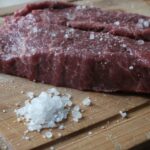
If you’re on the keto diet, you know that every gram of carbs counts. But you may be surprised to learn that fiber doesn’t cancel out carbs. In fact, it can actually add to your carb total for the day.
Does fiber cancel out carbs keto
No, fiber does not cancel out carbs on a keto diet. In fact, a keto diet is likely to include more fiber-rich foods than a non-keto diet, as vegetables are an important source of both nutrients. However, it’s important to remember that not all carbs are created equal. Fiber is a type of carbohydrate that the body cannot digest, so it does not have the same effect on blood sugar levels as other types of carbs. This means that you can eat foods that are high in fiber without worrying about them knocking you out of ketosis.
How Fiber Affects Carbs and Keto
For years, low-carb dieters have been told to avoid foods high in fiber because fiber contains carbs. However, new research is showing that fiber may not have the same effect on blood sugar levels as other types of carbs. This is good news for keto dieters who want to include more high-fiber foods in their diets.
Fiber is a type of carbohydrate that the body cannot digest. Unlike other carbs, fiber does not raise blood sugar levels. In fact, fiber may help to slow the absorption of other carbs, which can help to keep blood sugar levels stable. Fiber is found in plant-based foods such as fruits, vegetables, and whole grains.
The recommended daily intake of fiber is 25 grams for women and 38 grams for men. However, most Americans only consume about 15 grams of fiber per day. Adding more high-fiber foods to your diet can help you reach your daily recommended intake.
The Benefits of Fiber on a Keto Diet
If you’re following a keto diet, you’re probably well aware of the importance of balancing your macros. But what you may not know is that fiber can actually help you hit your macro goals, even though it’s a type of carbohydrate.
Fiber is a type of carbohydrate that the body cannot digest, so it doesn’t have any impact on blood sugar levels. This means that, even though fiber counts as a carb, it doesn’t affect ketosis. In fact, many keto dieters use fiber to help them reach their desired macro ratios.
There are two main types of fiber: soluble and insoluble. Soluble fiber dissolves in water and binds with other nutrients to slow down digestion. This can be helpful for people who want to stay in ketosis because it keeps them feeling fuller for longer and helps to control blood sugar levels. Insoluble fiber, on the other hand, does not dissolve in water and passes through the digestive system relatively unchanged. This type of fiber is good for promoting regularity and preventing constipation.
Most plant-based foods contain both types of fiber, but some are higher in one or the other. For example, oats are higher in soluble fiber while wheat bran is higher in insoluble fiber. When choosing foods for your keto diet, aim for those that are high in soluble fiber like nuts, seeds, and leafy greens.
The Risks of a High-Fiber Diet
Fiber is an important nutrient that can help regulate digestion and keep you feeling full after eating. However, some experts believe that too much fiber can cancel out the benefits of a low-carbohydrate diet.
The ketogenic, or “keto,” diet is a high-fat, low-carbohydrate Eating too much fiber on a keto diet can kick you out of ketosis, the metabolic state in which your body burns fat for energy.
While fiber is an important part of a healthy diet, it’s important to monitor your intake if you’re following a low-carbohydrate diet like keto. Too much fiber can have the opposite effect of what you’re trying to accomplish with your diet.
How to Get Enough Fiber on a Keto Diet
Fiber is an important nutrient for everyone, but it becomes especially important on a keto diet. Why? Because when you cut carbs, you also cut out a lot of the fiber-rich foods that are typically a part of a healthy diet, like fruits, vegetables, and whole grains. This can lead to constipation, which no one wants.
There are two types of fiber: soluble and insoluble. Both are important for keeping you regular, but insoluble fiber is what does most of the work when it comes to preventing constipation.



